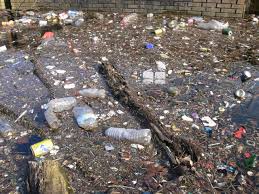The major forms of pollution are listed below along with the particular pollutants relevant to each of them:
- Air pollution, the release of chemicals and particulates into the atmosphere. Common gaseous air pollutants include carbon monoxide, sulfur dioxide, chlorofluorocarbons (CFCs) and nitrogen oxides produced by industry and motor vehicles. Photochemical ozone and smog are created as nitrogen oxides and hydrocarbons react to sunlight. Particulate matter, or fine dust is characterized by their micrometre size PM10 to PM2.5.
- Water pollution, by the release of waste products and contaminants into surface runoff into river drainage systems, leaching into groundwater, liquid spills, wastewater discharges, eutrophication and littering.
- Soil contamination occurs when chemicals are released by spill or underground leakage. Among the most significant soil contaminants are hydrocarbons, heavy metals, MTBE, herbicides, pesticides and chlorinated hydrocarbons.
- Littering
- Radioactive contamination, resulting from 20th century activities in atomic physics, such as nuclear power generation and nuclear weapons research, manufacture and deployment. (See alpha emitters and actinides in the environment.)
- Noise pollution, which encompasses roadway noise, aircraft noise, industrial noise as well as high-intensity sonar.
- Light pollution, includes light trespass, over-illumination and astronomical interference.
- Visual pollution, which can refer to the presence of overhead power lines, motorway billboards, scarred landforms (as from strip mining), open storage of trash or municipal solid waste.
- Thermal pollution, is a temperature change in natural water bodies caused by human influence, such as use of water as coolant in a power plant.
Air pollution
A government committee has estimated that 12,000 to 24,000 people in the UK die every year from the acute effects of air pollution. More die from chronic effects. Air pollution is therefore a major health issue.
In many parts of West London our air is not fit to breathe. The main source of air pollution is traffic emissions. Significant amounts also come from residential and commercial gas use, industry, construction sites and emissions from outside London. A particularly large and concentrated source of air pollution is Heathrow. Indeed, it is the biggest single source of pollution in Western Europe.
Water pollution
The Environment Agency is the government body responsible for water quality. It does some admirable work, but it suffers from the failing of most public bodies - it is not really prepared to take on those parties who are polluting our water. A notable instance has been heavy pollution of water bodies by Heathrow Airport. Nothing was being done about it by the Environment Agency until a concerted campaign was launched by local residents.
A particular class of pollutants which can get into water and which threaten our health and our wildlife are pesticides. 31,000 tonnes of pesticides are used in the UK every year. Overuse, careless use and incorrect disposal of pesticides mean that a range of dangerous chemicals get into our watercourses. Water companies have to constantly test for pesticides and removing them drinking water costs us - consumers of water - large sums of money.
Contaminated land and pollution of groundwater
There are significant areas of contaminated land in West London. This is the legacy of earlier industrial activity, at a time when looking after the environment and cleaning up after one had finished were not even considered.
There is now legislation that requires local authorities to identify contaminated land and, if necessary, make it safe. However, it has to be said that this is very low in the government's set of priorities.
Noise pollution
Noise is a common problem in modern-day life and it represents a serious threat to our quality of life. A recent survey showed that the biggest problems in London are, in order of priority:
- Traffic noise
- Aircraft noise
- Neighbour noise
- Construction noise
- Railway noise

No comments:
Post a Comment